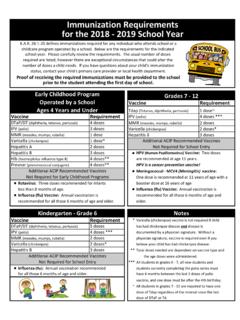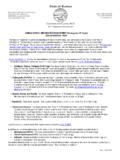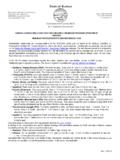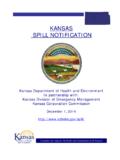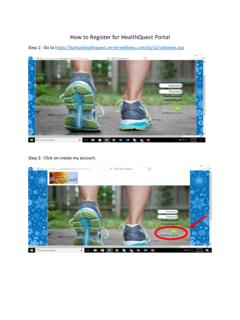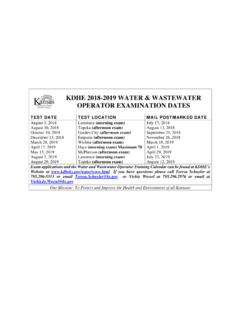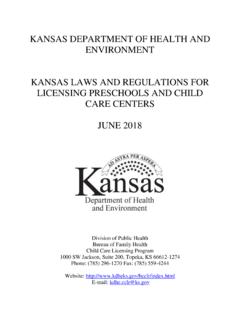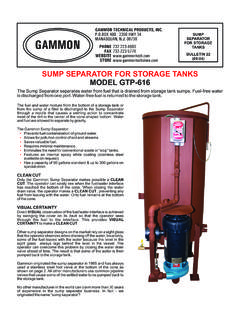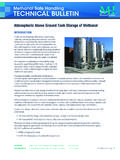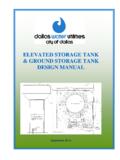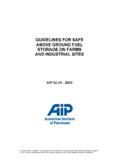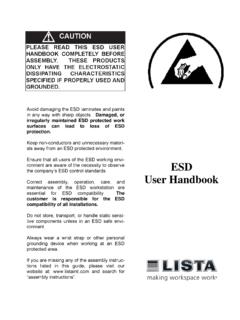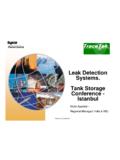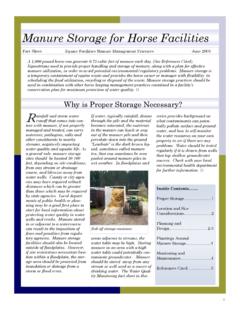Transcription of KANSAS STORAGE TANK PROGRAM - KDHE
1 1 KANSAS STORAGE TANK PROGRAM aboveground STORAGE TANK OVERVIEW April 4, 2018 Copies of this document are available at: As the state s environmental and public health agency, kdhe promotes responsible choices to protect the health and environment for all Kansans. Through education, direct services, and the assessment of data and trends, coupled with policy development and enforcement, kdhe will improve health and the quality of life. We prevent illness, injuries and foster a safe and sustainable environment for the people of KANSAS . KANSAS DEPARTMENT OF HEALTH AND ENVIRONMENT BUREAU OF ENVIRONMENTAL REMEDIATION STORAGE Tank Section 1000 SW Jackson, Suite 410 Topeka, KS 66612-1367 2 Table of Contents Page Table of Contents 2 aboveground tanks Regulated by the kdhe 3 Temporary aboveground STORAGE tanks 4 Requirements for New Tank Construction 4 Registration and Permitting of aboveground tanks 5 Registration of Small tanks 6 Secondary Containment 6 EPA Secondary Containment Requirements (SPCC)
2 6 The KANSAS Petroleum STORAGE Tank Release Trust Funds Overview 7 28-44-28 and 28-44-29 10 kdhe AST Contact Information 11 Spill Hotline phone numbers 12 EPA Region 7 Contact information 12 3 aboveground tanks Regulated by the kdhe The KANSAS Department of Health and Environment, Bureau of Environmental Remediation (BER) is responsible for regulating releases from aboveground STORAGE tanks (ASTs), as defined in the KANSAS STORAGE Tank Act. aboveground STORAGE tanks are defined as having more than 90% of the tank volume, including piping located aboveground or above the floor of an underground area such as a basement.
3 Certain types of tanks are exempt from the authority of the kdhe . Exempt tanks include the following: ( 65-34,103) tanks containing petroleum products which are not liquid at standard temperature and pressure (60 degrees Fahrenheit and pounds per square inch absolute). This exemption excludes propane, natural gas, and similar products from regulation by the kdhe under the KANSAS STORAGE Tank Act. It also excludes most types of asphaltic materials which are solids at standard temperatures, tanks located at crude oil production, transport, and refining facilities, tanks associated with electrical equipment ( transformers), tanks containing agricultural materials regulated by the State Department of Agriculture ( liquid fertilizers and pesticides), Small tanks , having less than 660 gallons capacity, used for business or retail purposes.
4 Or 1,100 gallons or less capacity and used for family farm or residential fuel supplies, Single family residence heating oil STORAGE tanks , and Flow through process tanks . Overall, kdhe requires registration of and AST Permits on all nonexempt ASTs that contain: Liquid petroleum product fuels: fuel oil, diesel, gasoline, kerosene, aviation fuels, and bio-fuels (ethanol, gasoline-ethanol blends, biodiesel and associated blends). Flammable or combustible liquids. Liquid hazardous substances listed in Table of the Comprehensive Environmental Response Compensation, and Liability Act (CERCLA).
5 Used oil. 4 Temporary aboveground STORAGE tanks kdhe does not require registration of and STORAGE tank operating permits for temporary ASTs. Examples of temporary ASTs are listed below: (1) ASTs mounted on wheels. (2) ASTs at same physical location for less than one year. Specific examples that meet one or both criteria include: (1) ASTs located at construction sites. (2) ASTs located at quarrying operations. (3) ASTs mounted on skids. (4) Fuel tanks in mobile generators. Requirements for New Tank Construction Many ASTs fall under the requirements of both the KANSAS STORAGE Tank Act and that of state and local fire codes.
6 kdhe and the KANSAS State Fire Marshal Office (KSFMO) work closely together to permit and register new tanks so that they will comply with both the safety requirements of the fire code and the environmental protection goals of the kdhe . 1. For tanks that contain flammable and/or combustible liquids, including fuels: new tank construction must be approved in advance by the KSFMO on forms they provide. The purpose is to provide the KSFMO with information that allows the agency personnel to verify that the new tank meets the applicable fire codes.
7 The review process generally takes between two weeks and three weeks. Specific installation questions on these ASTs need to be directed to the KSFMO at 785-296-0661 or 785-296-3401. KSFMO will issue an approval letter to either the tank owner or to the construction contractor that submits the application on the owner's behalf. KSFMO then sends a copy of the approval letter to kdhe . kdhe will send an aboveground STORAGE Tank System Initial Registration Invoice to the tank owner to be returned with a signature and fee payment. 2. For tanks that contain non-flammable, non-combustible CERCLA listed liquids: new tank construction must be approved in advance by kdhe .
8 Please complete the KANSAS Department of Health and Environment, Application for Above Ground STORAGE Tank System Permit, and submit it to kdhe for approval. Specific installation questions on these ASTs need to be directed to the kdhe at 785-296-8061. Once an application has been approved, kdhe will send the applicant an approval letter along with the aboveground STORAGE Tank System Initial Registration Invoice, that must be returned to kdhe with a signature and fee payment. 5 Registration and Permitting of aboveground tanks The KANSAS STORAGE Tank Act describes requirements for registration and permitting of existing and new ASTs.
9 Registration of a tank provides the kdhe with required information concerning the tank's ownership, location, age, size, type, and associated equipment. Tank owners obtain annual permits to operate ASTs by renewing the registration of each tank and paying the annual fee of $10 per tank per year. On or about November 15, kdhe mails annual registration renewal invoices to owners with existing ASTs. These owners must review the following information on their renewal invoices: Owner mailing address. Contact kdhe to receive an aboveground STORAGE Tank Change of Ownership (AST002) form if the ownership has changed.
10 Address where the facility is located. Number and status of tanks if any changes have occurred during the previous permit cycle. o If you have added or replaced ASTs, check to see if kdhe has received an application for your facility. o If you have stopped using or removed ASTs, contact kdhe to request an aboveground STORAGE Tank Change in Status (AST003) form. The Change in Status (AST003) form also may be used if you have taken tanks out of service or brought others back into service at that facility. Check the tank information for tank number, capacity, and substance stored.
